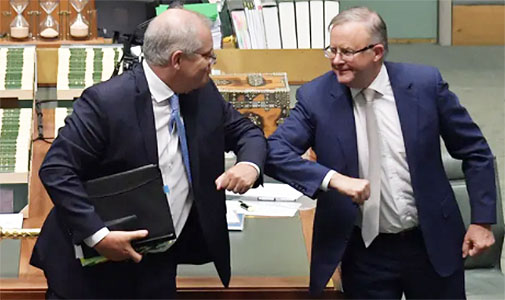IT IS increasingly difficult to distinguish between Coalition and Labor governments.
They are both populated (with exceptions) from an homogenous political class; as in any oligopolistic market where competition is never about price, their policies differ only at the cosmetic margins.
So while both sides plan to override the Nuremberg principle of informed consent on mass inoculations, pushing the myth that this will eliminate the Wuhan virus, the electorate is to be conveniently distracted by stunts like whether to pay $300 per jab.
While politicians are identical, Party members are not. That’s why Australians are the free world’s most disenfranchised…
David Flint
While politicians are identical, Party members are not. That is why members of Australia’s principal Parties are the most disenfranchised among comparable countries.
CAPTURED
Just as Australia’s representative democracy is captured, so are both sides captured by cabals of powerbrokers, lobbyists and assorted carpetbaggers.
Most of their near-identical policies turn out to be disasters, whether in defence, education, water, debt, immigration or their joint adherence to global warming catastrophism, even at the price of national ruin.
Incidentally, if carbon dioxide is really a pollutant, why force us to breathe our own in the masks we have to wear? And on the virus, while claiming credit for our geographical advantage, both sides endorse seriously damaging unnecessary lockdowns while ignoring, even ridiculing, proven medicines.
The next election is therefore unlikely to be about real policy differences. And if fake differences cannot be manufactured, it could depend on which leader is able to more closely approximates a pie-eating Aussie at the footy. If so, Mr Morrison will win.
We cannot discount the influence of the media in this.
Just look at the United States where the Biden administration has opened the borders to illegal immigration, crime and COVID-19, will nuclearise Iran, has made America energy-dependent, is soft on China and where the presidential family has a long record of selling influence and access to foreign oligarchs.
As probably the most corrupt media in the West chooses to ignore or suppress most of this, it creates less concern than the regularly reported myth that Donald Trump colluded with the Russians.
But no media can make the people do their bidding if they are not interested, as an almost unanimous media found in Australia’s 1999 republic referendum.
In the coming election, Clive Palmer risks neutralising his impact if, as he says, he campaigns this time against both sides.
He will probably increase the vote for good third-party candidates, but outside of the Senate, this is unlikely to dilute significantly the two-Party stranglehold over the House.
In the meantime, Labor is determined to remove or delay policies which will lose them votes, their downfall in the last election.
CONFISCATE
Apart from the “shy-Tory” problem – conservative people reluctant to reveal how they would vote – the pollsters underestimated how the approximately 15 per cent expected to vote for small conservative Parties would allocate their preferences. Most polls just applied how these flowed in the previous election.
But common sense suggested that in the privacy of the polling booth a number of “aspirational” voters and their extended families who normally vote directly or preferentially for Labor, would be put off by Labor’s policy to take away negative gearing, increase capital gains tax and confiscate self-funded retirees’ tax refunds on franked dividends.
As indicated here, there were two statistical indicators available to estimate in any electorate how many voters could be affected.
One was whether the average income of franked dividends was above the national median. The other was the number of people claiming a loss on rental property.
Applied to key marginal electorates, it was thus possible to estimate how many likely Labor voters would be adversely affected by a Shorten government.
In addition, Malcolm Turnbull had gone and Scott Morrison was a far more vigorous campaigner.
To most he probably looked like a “good bloke”, not the sort of man who would, for example, go on holidays in Hawaii in the middle of a bushfire crisis or campaign to overthrow his own first-term prime minister, neither tendency known at the time .
ELITES
Anthony Albanese has now cancelled all of these policies. But now with inner-city elites demanding he close coal mining and then gas, blue-collar workers in mining electorates fear he will betray them.
The fact that a Coalition would do much the same does not matter.
So Albanese is right to be worried. He made a secret visit to a Queensland coal mine recently but failed to announce a return to real Labor policy.
If he did, he fears he will lose city electorates to the Greens.
If Joel Fitzgibbon were leader, he would be less likely to worry; Greens preferences are not going to the Coalition nor is it likely that Greens MPs would ever bring down a Labor government.
The fact is we are not well served by the system of representative democracy, we are being offered essentially similar policies.
Americans were only able to preselect Donald Trump because primaries are in the hands of the people, especially in the Republican Party. (The Democrats worked out how to rig their primaries in time for the 2016 election.)
One solution favoured in some countries is for a good dose of direct democracy, especially through recall-elections.
The Coalition dangled this tantalisingly before voters in NSW in the 2009 election. But when an eminent panel recommended its introduction, their report was pigeonholed.
Another remedy is to allow voters to initiate binding referendums.
A proposal from South Australian Premier Charles Kingston for this was discussed informally around the 1891 federation convention, but Alfred Deakin successfully canned that on the basis that the Westminster system gave adequate control over governments.
That was before the two-Party stranglehold on the parliament.
Labor for a long time supported citizen-initiated referendums, but eventually abandoned this.
